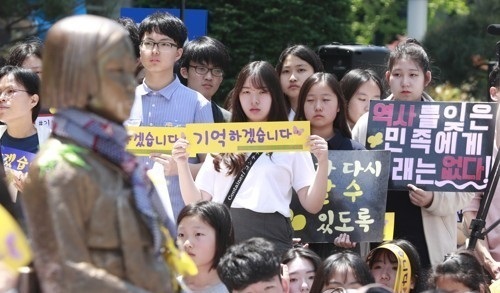Despite a 2015 deal between South Korea and Japan to end a bilateral feud over colonial-era sexual enslavement, its South Korean victims still have individual rights to sue the Japanese government for compensation, Seoul has recently concluded.
The government submitted the position to the Seoul Central District Court in late April upon the court's order to define the legal effectiveness of the agreement signed in December 2015.
 |
A weekly rally is under way in front of the Japanese Embassy, which is being renovated, in downtown Seoul on May 17, 2017, to demand Japan apologize for the sexual slavery of Korean women by the Japanese military during World War II. (Yonhap) |
The court was dealing with a civilian suit filed by 12 South Korean victims of Japan's wartime sexual enslavement, who wanted the government to indemnify Japan for psychological and material damage incurred by the so-called comfort women deal.
In a written response to the court, the government said, "The comfort women deal does not override the victims' individual rights to claim indemnity," according to a source close to the plaintiffs.
The deal had called for the two governments to put the issue to an end "for good and irreversibly," with Japan paying 1 billion yen ($9.1 million) to financially assist the victims.
Still, the government said in the court response that the deal is a political agreement that is not legally binding, but it should still be abided by because it is a promise between states, according to the source.
Then, the court again ordered the government to state what government steps would be taken to help the victims claim their indemnity, the source also said.
The government is reportedly weighing whether or not it will uphold the controversial deal with Japan since liberal President Moon Jae-in took power last month.
Moon has said most South Koreans do not approve of the deal, hinting at a possible renegotiation of the bilateral issue.
In light of the uncertainty, the court delayed its ruling by one month to early July at the request of the government. (Yonhap)







![[Today’s K-pop] Blackpink’s Jennie, Lisa invited to Coachella as solo acts](http://res.heraldm.com/phpwas/restmb_idxmake.php?idx=644&simg=/content/image/2024/11/21/20241121050099_0.jpg)
